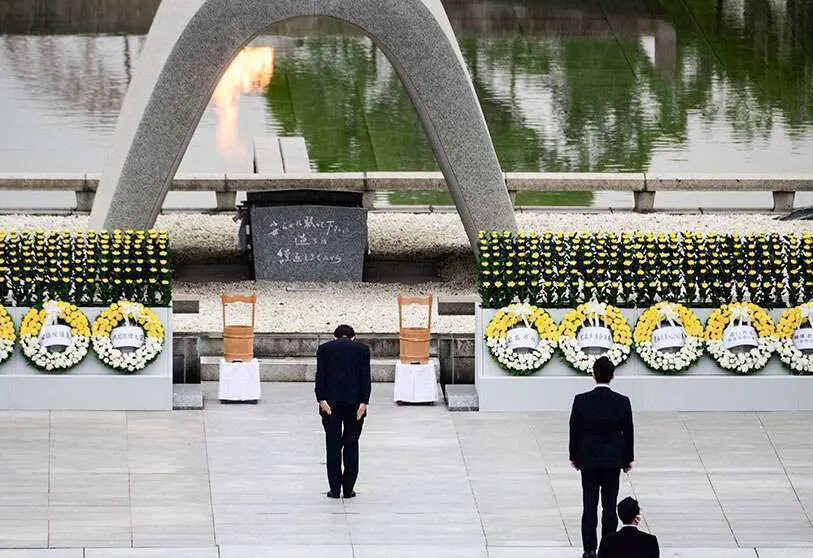Hiroshima commemorates its resilience 75 years after the atomic bomb

The worst predictions were that, after the atomic bomb, nothing would grow in Hiroshima for 75 years; but this Thursday's commemoration, just three quarters of a century later, testified to the resilience of this Japanese city.
The Mayor of Hiroshima, Kazumi Matsui, referred to those predictions at the ceremony recalling the nuclear attack on the city on 6 August 1945, three days before another atomic bomb destroyed the Japanese city of Nagasaki.
"It was rumored at the time that nothing would grow here for 75 years. But Hiroshima recovered and became a symbol of peace," Matsui said of the U.S. attack that killed some 140,000 people on the same day and later in the aftermath of the atomic bombing.

The event, in Hiroshima Peace Park, served to insist on the need for the Government of Japan, the only country to have suffered an atomic attack, to decide to sign the Treaty on the Prohibition of Nuclear Weapons approved three years ago at the UN, an initiative in which the Asian country was sidelined from the beginning.
Matsui called on the government to take this step in front of some 800 people, including authorities such as the Japanese Prime Minister, Shinzo Abe, and representatives of the "hibakusha" or survivors of the nuclear attack. "I call on the Japanese government to heed the call of the Hibakusha to sign, ratify and become a party to the NPT," Matsui said.
This treaty was approved at the UN on July 7, 2017 by 122 member states, but for it to enter into force it needs to be ratified by at least 50 nations and so far only 40 have done so, including neither Japan nor the nuclear powers. "Now more than ever, world leaders must strengthen their resolve to make this legal framework work effectively," he insisted.
The mayor of Hiroshima spoke after the presentation of floral offerings at a memorial recalling the tragedy and after a moment of silence as a bell rang at the time the bomb fell on Hiroshima at exactly 8:15 a.m. on August 6, 1945.
In a later message, Abe avoided any talk of the Nuclear Weapons Ban Treaty, but said that, as he has been repeating periodically, his country will fight "with tenacity" to achieve a world free of nuclear weapons.

This year's ceremony was held with fewer participants than at other times to avoid contagion from the coronavirus pandemic, which caused international leaders to be unable to attend and to make their presence known through video messages.
In previous years, the commemoration in Hiroshima ended with the launch of floating paper lanterns with messages of peace on the Motoyasu River, but this popular tradition was cancelled to avoid contagion.
Several hundred people also observed a respectful minute of silence on the bank of this river at 8:15 a.m., the exact time the bomb was detonated, and after that some of them threw red and white flower petals into the water.
Near the official ceremony, guarded by a large number of police, a demonstration was held with a few hundred people against war and nuclear weapons and a prayer group that sang mantras for the victims.

"A long time ago, the grandparents told their story, but many have already died. Now many young people don't remember this day, so this ceremony is so that it will never be forgotten," explained 39-year-old Tetsuka Kiwamu from Japan, who came to the Peace Memorial Park on his motorbike. Kiwamu's fear that the younger generation will forget what happened is shared by many atomic bomb survivors, who average over 83 years old.
"I think (this anniversary) is something very important to keep in mind, especially when some governments are talking about war again," Gerd Kramer, a 52-year-old former German military officer who walked for three weeks from Osaka to Hiroshima to raise awareness on social networks about the disasters of war, told Efe. Kramer says he will also be in Nagasaki next Sunday, where he will commemorate three quarters of a century since an atomic bomb was dropped on a civilian population for the second time.








